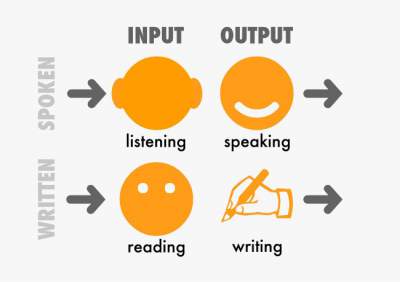Don't Shortchange your Kids!
Traditionally, many schools have tested their students English proficiency by a simple multiple choice exam, which only assesses your child's reading skills. Sometimes audio has been added to also test listening skills. Vantage believes this is an incomplete assessment and could lead to serious shortfalls or 'gaps' in a student's overall English language proficiency.
The Four Language Skills
There are four language skills that we need for complete communication. When we learn our native language, we usually learn to listen first, then to speak, then to read, and finally to write.
 |
Though related, each of the four skills — listening, reading, writing and speaking — are distinct and each uniquely contribute to a student’s overall communicative ability. It’s this broader trait of communicative competence — not specific individual skills — that is critical in most academic (and later in workplace settings).
It is important, however, to test each of these four langauge skills individually — from a young age — because each is a critical aspect of communicative competence. And while listening and reading tests can provide an indirect indication of speaking and writing ability, they provide no comprehensive assessment of communicative ability.
It's typically the speaking skill that doesn't get tested, which often means it is not specifically taught. This can lead to students who can comprehend English at higher grade levels, but are handicapped in their ability to effectively communicate through speaking — a skill deficiency can be critical later at university or in a workplace setting.
A Comprehensive Assessment
Cambridge ESOL tests are the industry standard in delivering a comprehensive, four-skill English language assessment for your students.
Cambridge Speaking tests, for example, are conducted by trained, certified examiners. All Cambridge-certified examiners must prove each year, through a certification process, that they are competent to assess. In addition, they are regularly monitored during live testing sessions. The quality assurance of Speaking Examiners is managed by Team Leaders who report to Cambridge ESOL's Professional Support Leader.
They are awarded marks by two examiners: an assessor and an interlocutor.
The interlocutor awards a mark for the performance as a whole, using the Global Achievement scale. The assessor awards marks for the following five individual criteria:
 |
Grammatical Resource |
 |
Lexical Resource |
 |
Discourse Management |
 |
Pronunciation |
 |
Interactive Communication |
See for Yourself
Click on the links below to watch a specific Cambridge ESOL speaking examination for a specific test at a specific CEFR English proficiency level. The speaking exams get longer and more comprehensive as a child's proficiency level increases.
Need to Know More?
You can find a lot more details on the assessment criteria and a guide on how to use them in asessing speaking performance in the Teaching Resources section of this Cambaridge ESOL's website.
Speak to your child's school today to find out how they assess English speaking skills.